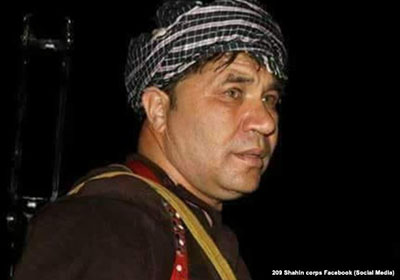By Sayed Salahuddin

Nizamuddin Qaisari, who is also a district police chief, was arrested on July 2 after he allegedly insulted and threatened to kill people during a provincial security meeting. (Photo: 209 Shahin corps Facebook)
As Afghan President Ashraf Ghani seeks to build momentum for peace talks with Taliban insurgents, a violent threat Wednesday from supporters of a powerful exiled warlord raised concerns that the government still faces pressure from ethnic minority leaders that could undermine its authority.
For a second consecutive day, thousands of people in northern Faryab province protested the arrest of a commander loyal to Abdurrashid Dostum, the exiled ethnic Uzbek strongman who is technically first vice president under Ghani but has fled the country amid charges of abusing a political rival.
The demonstrators stormed the national intelligence agency’s offices in the city of Maimana, then looted and destroyed the provincial governor’s compound, according to Hashim Urtaq, a legislator who was reached by phone in the city.
Unruly ethnic factions remain a persistent challenge to central authority and stability in Afghanistan, periodically clashing with government forces and following leaders like Dostum, who broke with the Ghani government that had handpicked him to serve as a bridge to his ethnic group.
While Afghan and U.S. forces struggle to reverse gains by the Taliban, a recent successful cease-fire has raised hopes for a political solution, but the uprising in Faryab is a reminder that other armed forces — including who also oppose the Taliban — can still cause serious trouble.
Ghani’s government remains politically divided, with long-delayed parliamentary elections scheduled for October and the president expected to seek reelection next year. Ghani, an ethnic Pashtun, is often accused of ethnic bias, and revolts such as the one by Dostum’s supporters can fan such flames.
The protests were triggered by the recent arrest of Nizamuddin Qaisari, a senior commander for Dostum in Faryab, where he leads a local force against the Taliban but has also been accused of wielding power through bullying and intimidation. Qasiari was detained and sent to Kabul after a confrontation with military leaders in Faryab.
Protests erupted Tuesday and turned violent Wednesday, with two demonstrators reportedly shot dead. There were conflicting reports over whether the shots had come from the crowd or from police. A spokesman for Faryab’s governor, Javed Bidar, said some of the protesters carried “assault rifles, machine guns and rocket propelled grenades.”
Dostum sent a message from Turkey, which was posted on Facebook, warning that unless Qasiari is immediately released, the government will face “serious challenges, including in the upcoming elections.”
Urtaq, the legislator, described Qaisari as a “villainous” person and accused Dostum and some factions of stirring up problems for the central government ahead of the elections. He said he feared the protests may spread to other parts of the Uzbek-dominated regions in the north.
Dostum was disgraced and driven from office after he allegedly beat an elderly rival politician and ordered his guards to sexually assault him, yet even in exile he remains a force to be reckoned with.
Najib Mahmoud, a political analyst, said Ghani’s government now faces a difficult dilemma. If Qaisari is not released, he said, the protests and violence may spread. But if he is set free, “he will become stronger.” Either way, Mahmoud said, “it will put more pressure on the government.”
Sharif Hassan contributed to this report.



